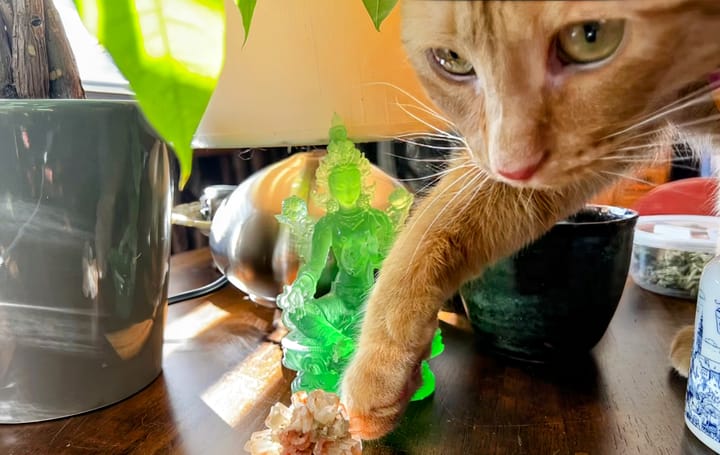New year, same you! 🎉 Some plural anti-resolutions for a mellower start to so-called 2024
The beginning of a new year can be an exhausting period of anxious urgency that ends, predictably, in failure and remorse. How unpleasant! Here are some ways that living more plurally can help you feel more comfy at the beginning of the arbitrary slice of time we call “2024.”

Welcome to the very first installment in our Year of Living Plurally, friends! Because I am nervous, this first newsletter is much too long, because anxiety makes me chatty. I promise greater brevity next week. Anyway, see what you think, and write back if you are so inclined. If you are short on time, here ares the plural practices to try, and here is the part where we explain about the snow picture. — Ash
“The perfect time to start fresh” 👀
On Tuesday, the first official workday of the shiny new year, I spent the whole morning looking for apps. Just a glimpse of a headline about “getting organized in 2024” — my feed has teemed with resolution-themed articles this week — reminded Johnny, the part of me who handles business operations, that our administrative infrastructure is tragically sub-optimal.
“It’s been a problem been for years, Ash,” he observed. (Johnny is very businesslike for a boy of just sixteen.) “It’s the the perfect time to start fresh with better systems. We’ve been wanting to quit Google stuff for ages, so why not now? Data sovereignty everywhere, open-source everything, no more proprietary formats. And also, while we’re at it” — he consulted his notebook — “I need to figure out automatic time-tracking this year too, because everybody always forgets about it, and then I can’t tell where our time goes.” He’s right, we do forget.
And with nary a murmur of objection from anyone else in my head, Johnny plunged us headlong into an urgent quest for the perfect combination of productivity software — a quest he has undertaken, with equal urgency, at least quarterly for the past decade (and sometimes at the beginning of the month, too).
He didn’t succeed on Tuesday, either, poor kid. This time he gave up by noon.
The unpleasantly powerful “fresh start effect”
I don’t blame Johnny for his new-year urgency. Other parts of me felt it too, in their own ways, and I bet parts of you can relate. As it turns out, lots of people feel intense pressure to be a new person in the new year. By a trick of the mind called the “fresh start effect,” people these days seem conditioned to respond to landmarks on the calendar by resolving to be better.
In a now famous paper from 2014, Katherine Milkman and colleagues found dramatic, predictable spikes in evidence of what they considered “aspirational behavior,” like googling the word diet. (One might question the wisdom of that particular aspiration, though the authors of this paper do not.) Their analysis suggested that “naturally occurring time markers” — new weeks or months or years, birthdays and anniversaries (which aren’t all that “naturally occurring,” actually) — make people feel temporarily “disconnected from their past imperfections” and therefore capable, however briefly, of transcending them. “We postulate,” the paper concludes cheerfully, that “fresh start moments encourage people to pursue their aspirations.” (Here's the PDF if you would like it.)
Yes, yes they certainly do — which makes calendar-flipping moments into narrow windows of urgent make-or-break opportunity for the members of our communities, at various scales, who are dedicated to making us better — personal trainers, community organizers, manfluencers, public-health agencies, listicleurs, nonprofits, declutterers. (Listicleur is a word I made up for a creator of listicles.) I myself am no exception. A wee ad for my coaching practice, just 2⅓ inches square, will appear any day now in the annual “Health and Fitness” issue of Lavender. (Grab your free copy at your supermarket or co-op, Minnesotans! Look by the carts and baskets.)
For obvious reasons, the “fresh start effect” is a catnip, or kryptonite, for the parts of us who strongly believe we can and must improve.
❄️ The misery of managers in January
It was Johnny, naturally, who came up with the idea to advertise around the turn of the year. He is the part of me who most closely resembles a reader of Management Science, the journal in which the famous “fresh start” paper appeared. (Sometimes other parts of me call him “Alex P. Keaton” as a joke, but he honestly doesn’t mind. He admires Alex’s clarity of purpose.) The Internal Family Systems model calls such parts of our personalities “managers,” a low-key shady term I have always bristled at. Nobody likes being “managed”; nobody dreams of being “in management” when they grow up. But the humorless businessine mealiness of manager can feel uncomfortably apt during this first week of the year, when the “fresh-start effect” makes our most cherished self-improvement projects seem briefly achievable.
Every new year, every birthday, managers like Johnny glimpse the possibility of perfection. Capital, who feeds on human striving, is happy to egg them on. At times like this, with the best intentions in the world, our managers can seize the reins of our lives in ways that make them, and us, feeling much worse in February than we did in December.
“It’s as though I’ve got this one chance,” Johnny told me, later in the week. “I keep track of everything, Ash! I see what went wrong last year, and I know we can do better this year. But the rest of you” — he gestured broadly around my inner world with a look of — “won’t let me do what needs to be done!”
I patted him gently on the back. “I know, kiddo,” I said. “The good news is, you don’t have to go it alone.”
Johnny brightened, then blushed. “That’s right,” he murmured. “I keep forgetting.”
From our system to yours, here are some plural ideas to help your inner managers ride out resolution season with a little more ease and comfort.
Plural practices to try for a less mellower start to so-called 2024
🌺 1. Let a million resolutions bloom
At every scale, managers’ improvement projects fail when labor won’t cooperate. Most organizations approach this problem by trying to make workers cooperate in various coercive ways, which work well enough until, at length, they don’t.
To avoid internal labor unrest as 2024 begins, you can invite every member of your inner community to express their hopes for the year — not just the parts of you whose ambitions square with the ambient culture, but every part of who you are.
This pleasant exercise will help the managerial parts of your personality step back from their own urgent priorities and admire the opulent profusion of visions for the future that coexist within you! Flattening the hierarchy of your dreams like this — just making a list — can reveal joyful new opportunities for solidarity.
- First, ask your responsible managers to suggest new year’s resolutions. They will be all too happy to do so, and they will have plenty of data to bolster their case. Johnny, for example, wants 2024 to be the year I quit smoking, pay quarterly estimated taxes, consolidate high-interest debt, double my coaching income, eat more fiber, etc. (And the productivity-software and time-tracking things, too.)
- Then, invite all the other inhabitants of your inner world to add new year’s resolutions of their own. Your managers will roll their eyes at such folly, of course, but the exercise is silly enough that they’ll let you get away with it. I, for example, have other parts who want me to resolve to:
- hide in a tiny hole underground all year
- cultivate intentional queer community
- read pleasant fiction
- (redacted) my husband’s (redacted) until we (redacted)
- drink more water
- wear sparkly jewelry and colorful makeup
- take a silent retreat in the wilderness
- send out a weekly newsletter
- strike fear in the hearts of evildoers
- take piano lessons
- Finally, look for consensus. Learning about the aspirations of every member of your inner community, not just those whose aspirations appear most frequently in early-January listicles, often demonstrates the futility of managerial aspirations. (If a managerial part of you wants to go to the gym every day while your body and inner children desperately need to sleep as much as possible, you will simply not go to the gym for long.) More importantly, seeing the whole vast diversity of your hopes and dreams can reveal hitherto unsuspected opportunities for joyful shared endeavor. That is how the various parts of my personality discovered that Johnny’s newsletter idea actually appealed to all the members of my inner family. We have also decided to invest small amounts of spending money in drug-store makeup and thrift-store fripperies.
2. F*ck the fence: creating your own calendar 🐇
The Gregorian year is a made-up thing. So-called 2024 — a social convention that denotes, despite noble efforts to obfuscate its weirdness, 2,024 solar cycles since the putative birth of the Christian savior in a small now war-torn town — is nothing but a vaporous social convention with a comically kludgy history, untethered to any material reality beyond that of human convenience in an accidentally christocentric world.
To a rabbit, a bacterium, your body or mine, there is no meaningful difference between December 31 and January 1, or between your birthday and the day before. In every literal sense, the cells and atoms and vast microbial communities of your body do not care about years or months or weeks or anniversaries at all.
The managerial parts of who you are, practical and literal as they tend to be, are likely to take such considerations seriously. The sheer arbitrariness of calendar years can help them detach from the urgency of the moment to think of time in different and more healing and liberating ways.
For example:
🐾 2A. Follow your pawprints back
This January, try making retroactive resolutions to honor your ongoing development.
Here’s a grand example: I wrote a novel in 2022. I did not set out to do that, but it kind of happened. At the end of that year, Johnny observed ruefully, “We should have resolved to write a novel this year!” Then somebody else had a delightful thought: What if we pretend that we had? And all of a sudden, without any particular resolution at all, 2022 turned out to have been became a year of triumphant achievement.
Less impressive retrospective resolutions can be just as interesting — even resolutions our managers would not really have made. For example, I realized this past October that I have drunk alcohol or smoked weed every day since I left A.A. in 2019. Literally every day. This is not the kind of resolution a person’s managerial parts would make on purpose, but it’s helpful information all the same.
🤔 2B. Define your own fresh starts
Human conventions are just one way to divide up time. Your system has its own “naturally arising time markers,” unique to your experience — and they can help you understand your own growth in ways that make indigenous sense within you.
Rather than setting goals for the first of the year, for example, you could reflect on your progress at certain moments that mean something inside of you (whether or not such moments occur at predictable calendar times).
You might wonder, for example: How have I changed since the last time …
- I noticed wood smoke in the air
- the first crocus, jogger, housefly, etc. showed up in the springtime
- I thought of somebody or other
- this song showed up in a playlist
- the lilacs bloomed
3. “Discerning impermanent nature”
Perhaps the most powerful source of consolation for the parts of ourselves who feel pressure to be better is the fundamental fact of constant change. In one way, you are exactly the same you from one year to another. New year, same you. But in another and just as meaningful way, the very idea of “you” is as much a fairy tale as the months of the calendar.
The reality of constant change, as unsettling as it may seem, often helps the anxious managerial parts of yourself mellow out at “fresh start” times like this. When the weight of a new year’s expectations gets too heavy for them to bear, you can remind your managers that the “new you” has already arrived — and arrives again and again, every moment, as long as life endures.
In this lovely guided meditation, my favorite teacher Michael Lobsang Tenpa tenderly coaches our skeptical manager parts to be “little scientists,” compassionately observing the ever-changing field of our bodily experiences. It has helped us a lot when we feel overwhelmed by the obligation to be a “new me.” It’s less than 14 minutes long, with a little bell to begin and end:

That’s all for today, my friends. I have gone on far too long — 2,000 words, yikes — and I promise to be briefer next week. From my internal family to yours, best wishes for a mellow start to so-called 2024.
Your plural pal,
Ash



